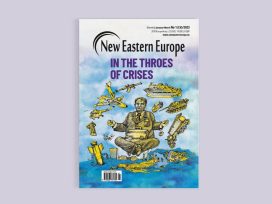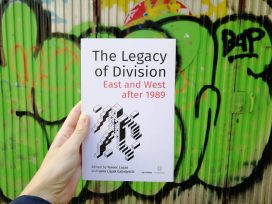
Incomplete Europe
New Eastern Europe 1–2/2023
What the war in Ukraine has taught us about solidarity; why European democrats must insist on fair play; and Moldovan democracy under hybrid attack.
The Czech communist party might be an anachronism, but to ostracize it only prolongs its existence. Whether irrational or calculated, anti-communism in the Czech Republic distracts from more pressing problems, writes Marek Seckar.
Here in the Czech Republic, a debate repeatedly occurs about whether we are still a post-communist country. Those who argue in the negative often refer to the fact that, nearly twenty years after the Velvet Revolution, there are very few social problems facing us that are directly connected with the communist period. This argument seems strong: the basic problems of Czech political and social life today can indeed be considered the fruit of the last two decades, rather than of the previous phase.
This approach, however, can be misleading. Precisely because most the troubles we have met in the last twenty years cannot be considered a direct result of communist rule, but rather of the political and economic transformation and the abuse of power that took place in its course, it seems imprecise to cite their lingering effects as proof that society is not “post-communist”.
If we want to determine whether our society is or is not post-communist, we have to define post-communism in some way. It is possible to approach this from several angles, but soon we will discover that the only more or less coherent definition is the subjective one: a post-communist society is one that considers itself as such.
If we take a cursory look at the topics of current Czech political and social discourse, we notice that communism is discussed very frequently and on very different levels – starting with insightful historical debates and ending with hysterical shrieks and insults. We have as many as two institutes studying the crimes of communism; we have the lustration laws and the scandals over collaboration with the state security; we have the StB archives and the heated debate about the manner of making them public; we have trials of the culprits, but also awards and words of appreciation for the victims. We have nostalgic TV programmes in which we are assured that it wasn’t really that bad, that it even had some charm of its own. And not least, we have the satisfaction and the pride of having gone through something very special, of knowing better and having experience not easily rivalled.
The only problem is that so far we haven’t been able to make good use of this experience and pass it on. And we also have one very peculiar phenomenon, cropping up here, there, and everywhere in many different forms. This phenomenon is deliberately misused anti-communism.
Don’t be mistaken: I don’t mean objective attempts to answer to why our society so readily succumbed to a dangerous ideology, and why we accepted this ideology so unreservedly. Nor do I have in mind the effort to identify and – if possible – punish the perpetrators of individual crimes, as well as those more broadly responsible. And I certainly don’t mean to nod in agreement with the Czech president Václav Klaus, who some time ago criticized the “blind anti-communism” of Czech dissidents of the 1970s and 1980s, saying that it was rather the “simple Czech”, with his Schwejkesque inner resistance and factual parasitism, who was instrumental in deposing totalitarianism and establishing democracy.
By anti-communism I mean, rather, certain tendencies among Czech politicians often adopted in intellectual circles. Here, repeated and usually unsubstantiated references to the communist past have become fashionable, a cheap, easily accessible and copiously used means of political struggle, an irrational argument, a cloak that distracts us from the real problems.
After 1989, the communist parties in most countries in the former Eastern Bloc were forced to deal with the dilemma of their future existence. Should they stick to Marxism-Leninism as the only valid ideology or admit the crimes and mistakes committed on its behalf? Should they get rid of their unpopular leaders and offer the public new and more promising faces? Most parties made a genuine attempt at some kind of transformation. They changed their names and henceforth strove to become regular political parties within the democratic system. Some were even successful and can now be considered normal parties of social democratic orientation. Others, on the other hand, were unable to carry out a convincing transformation and after several years disappeared from the political stage.
However Czech communists were different. Possibly because of the lack of any reformist wing within the party, they approached the problem in their own way. In order to save face and their future political existence, they did virtually nothing. They preserved a name containing the word “communist”; they refused to renounce Marxism-Leninism; and they continued to profess to communist society as their goal and class struggle as the means to accomplish it. It is true that they removed some of their highest representatives, but they didn’t accompany this change with any inner reflection. They still consider the forty years of communist rule, a couple of “errors” aside, to be irreproachable.
With the benefit of hindsight, we can say that their passivity ensured the Czech communists’ survival. Not only are they still operating as a fully functioning parliamentary party, they also enjoy stable support oscillating between twelve and fifteen percent of the vote, sometimes even going up to twenty percent.
According to their party statutes and electoral programme, the Czech communists are, just like their ancestors, revolutionaries striving for radical social and economic change, unrestricted seizure of power and instalment of the dictatorship of the proletariat. But the practice is different: in reality, the communist party offers no positive programme and in the political struggle contents itself with occasionally obstructing the efforts of other parties (Nato membership, negotiations with the EU, the American missile shield, etc.). In areas not manifestly controversial from its point of view, the party even appears to be a fairly reasonable political force, with which it is possible to enter into constructive negotiations. It is impossible to imagine that in this condition and with these people in charge, the party could become a vanguard of the proletarian revolution, seize power by force, hold it in the long term and introduce profound changes throughout society. Rather, it is more concerned with a stable existence within the present system, a reasonable share of power and a comfortable life for its representatives.
Given the yawning gap between its declared goals and actual policy, how is it possible that the party not can only survive, but also retain stable electoral support? After all, it has no noticeable public figures at its disposal, is not able to contribute in a fundamental way to the debate about the problems of Czech society, spends much less money on promotion than its political rivals – in short, in many different respects is simply having a free ride. Could it be that the answer to this question can be found not in the communist party itself, but in the postures adopted towards communists by the representatives of other parties, and also by a substantial part of Czech society?
The communist party is officially ostracized. Most so-called democratic parties have banned themselves from co-operating with the communists at the parliamentary level. The communists are not considered adequate partners in debate and are repeatedly branded as being one of the biggest menaces Czech democracy faces. This radical posture can change only on several conditions: the communist party distances itself from its past; undertakes to respect the rules of democratic political competition; and excuses itself unambiguously for the its past crimes (not “errors”). In other words, the Czech communists are required to do exactly what the communist parties in other countries did: to become something else, and with this new identity to defend their existence in the political struggle.
Logically enough, the communists don’t want to do anything of the kind. The existing situation provides them, at least for the time being, with a cosy existence without the necessity of inventing and carrying out any political programme. What’s more, they realize that the never ending attacks from the outside provide their party with the necessary drive, the ethos, that they are unable to produce themselves. For this reason, the Czech communist party is negativist in more than one sense.
This ever-present ostracism gives the communists one more advantage. In the atmosphere of scepticism and disappointment at politics, which Václav Havel once fittingly called the “gloomy mood” and that has since become a chronic disease of Czech society, the communist party is, thanks to its isolation, the only political force that has no share in the omnipresent dirt. It is a party that, despite its strong electorate, has never in the last twenty years participated in real exertion of power and hence has never had the opportunity to “betray” the voters. As such, it remains in the eyes of some people a paragon of purity. Let’s add to this the fact that communist ideology has always enjoyed relatively strong support in Czech society. Unlike other countries, here it is by no means a Soviet import. Suddenly there is no more need to ask why the Czech communists can always rely on a decent number of voters.
Why, then, do the “democratic” political representatives continue with their ruthless verbal attacks and theatrical anti-communism if their main goal consists in, as they say, putting an end to the heritage of communism? Would it not be better to adopt a more conciliatory approach, to engage with the communists in a democratic discussion and let them defend their opinions? Would it not even be advantageous for mainstream parties to leave a place for the communist party in the decision-making process, a sure way for it to lose its untainted aura? If we look at the situation more closely, we see that with only minor exceptions the anti-communist attacks of Czech politicians are rather verbal than material: they aim rather at symbols than at the core, and as such are themselves symbolic and, above all, toothless.
Really toothless? As far as Czech society’s coming to terms with the communist past is concerned, yes. Yet anti-communism can also be considered a highly deliberate activity whose goal is to divert attention from real social problems, and to score points in the everyday political struggle.
Sometimes, these efforts take grotesque forms. Let me mention an example that was discussed by the Czech newspapers for several months. A stone’s throw from the place where I live, in the Brno district of Královo Pole, is a small park and in it a modest memorial to the soldiers of the Red Army who died liberating this part of the city in April 1945. For years after 1989, the locality was neglected and nobody seemed to mind that the monument was decorated by the symbol of the Red Army: the five-pointed star with hammer and sickle inside.
But not long ago, the district council declared that the forgotten place brought shame on the neighbourhood and decided to renovate the monument. They sought the opinion of the office for the preservation of historical monuments and were advised to restore the memorial as it was – including the Red Army symbols. This is how the council decided to proceed, and a private company was charge with the task.
So far, so good. However, one of the councillors, a member of the very party that actually decided to preserve the monument, disagreed and started to act on his own. Armed with a grinding machine, he set out for the monument and ostentatiously removed the hated symbols from it; when the police arrived, he let himself being arrested and paid the imposed fine (a rather symbolic amount in view of his real income).
The pragmatism of this conduct was impossible to miss. A little-known local politician carries out a heroic act, which nevertheless involves no real risk to him, and at once draws a degree of media attention he would never be able to gain after years of keen political work. Yet the reaction this act caused, not only among politicians but also in intellectual circles, was surprising. The district council insisted on its previous decision and placed the hammer and sickle star back on the monument (now not cut in stone, but in bronze). A group of people unwilling to accept any such thing formed around the self-appointed anti-communist. They argued that the symbol of the Red Army was a simple star without the hammer and sickle (which is not true). In a country that had been devastated by the communists for forty years, such symbols are inadmissible, they said (as if there were not dozens of similar memorials throughout the country). It was as if a monument to German soldiers killed in the Second World War were adorned with a swastika.
Journalists took up the story and the incident was condemned by the Russian embassy, whereupon certain voices started to compare the “Brno crisis” with the situation in Tallinn in Estonia some time before, where the removal of a Soviet monument had sparked off riots. However, if this comparison shows something, it is mostly just the irrationality and impropriety of this anti-communist hysteria. First of all, unlike in Estonia, there is no significant Russian minority in the Czech Republic. And second, in Estonia there is room for debate in the question whether the Soviets were liberators or invaders. In the Czech Republic, it is evident that the Soviet soldiers who came in 1945 were liberators, and that Czech society perceived them as such and welcomed them with due joy.
But the dispute over communist symbols on the Soviet monuments was not going to end so easily. More people set out for the memorial, among them a few individuals I hold in high esteem, now armed not with grinders but with brushes and glue in order cover the loathsome symbols with the portraits of Milada Horáková, one of the first and most famous victims of the communist dictatorship. The police – confused and hesitant – came again, arresting and imposing fines. All this was going on above the remains of dozens of dead soldiers, soldiers who came from afar to be killed while liberating a city completely unknown to them from the hands of the Nazis.
If we take a look at the political scene in the Czech Republic today, we can easily identify the most serious problems. The populist policies of the political leaders, their absolute inability to negotiate with each other and seek compromise; the aggressiveness and complete lack of political culture; the unscrupulous corruption and the alienation between politicians and the electorate; widespread manifestations of racism and extremism, against which neither the government nor the police are able to proceed. The list goes on. But one thing is clear: not one of these problems has anything to do with the communist heritage.
Nevertheless, the anticommunist posturing of politicians and intellectuals is based on the assumption that the communist past is the essential problem of Czech society. Their ammunition is mostly verbal and their target is the communist party; this, in its political isolation, remains immune, and even benefits. Still, it is beyond doubt that today’s communist party is not especially dangerous to Czech society. On the contrary, its existence might be somewhat advantageous: it binds to itself the chronically disappointed and extremist-oriented part of the electorate, whom it makes ineffective by its total inability to act.
Only exaggerating slightly, we can say that purposeless (or perhaps calculated) anti-communist postures are the symptom of a post-communist society unable to deal with its thorniest problems. Instead of focusing on the present and the future, society remains bound to the past and its long since pointless questions. Still, we should not assume that this situation will be rectified soon. After all, whoever wants to deal with his past must first move on.
Taken from a special English language edition of Res Publica Nowa, published with the support of the International Visegrad Fund

Published 23 October 2009
Original in English
First published by Res Publica Nowa V4
Contributed by Res Publica Nowa © Marek Seckar / Res Publica Nowa / Eurozine
PDF/PRINTSubscribe to know what’s worth thinking about.

What the war in Ukraine has taught us about solidarity; why European democrats must insist on fair play; and Moldovan democracy under hybrid attack.

What is racism against eastern Europeans? And what did Viktor Orbán learn from Slavoj Žižek?